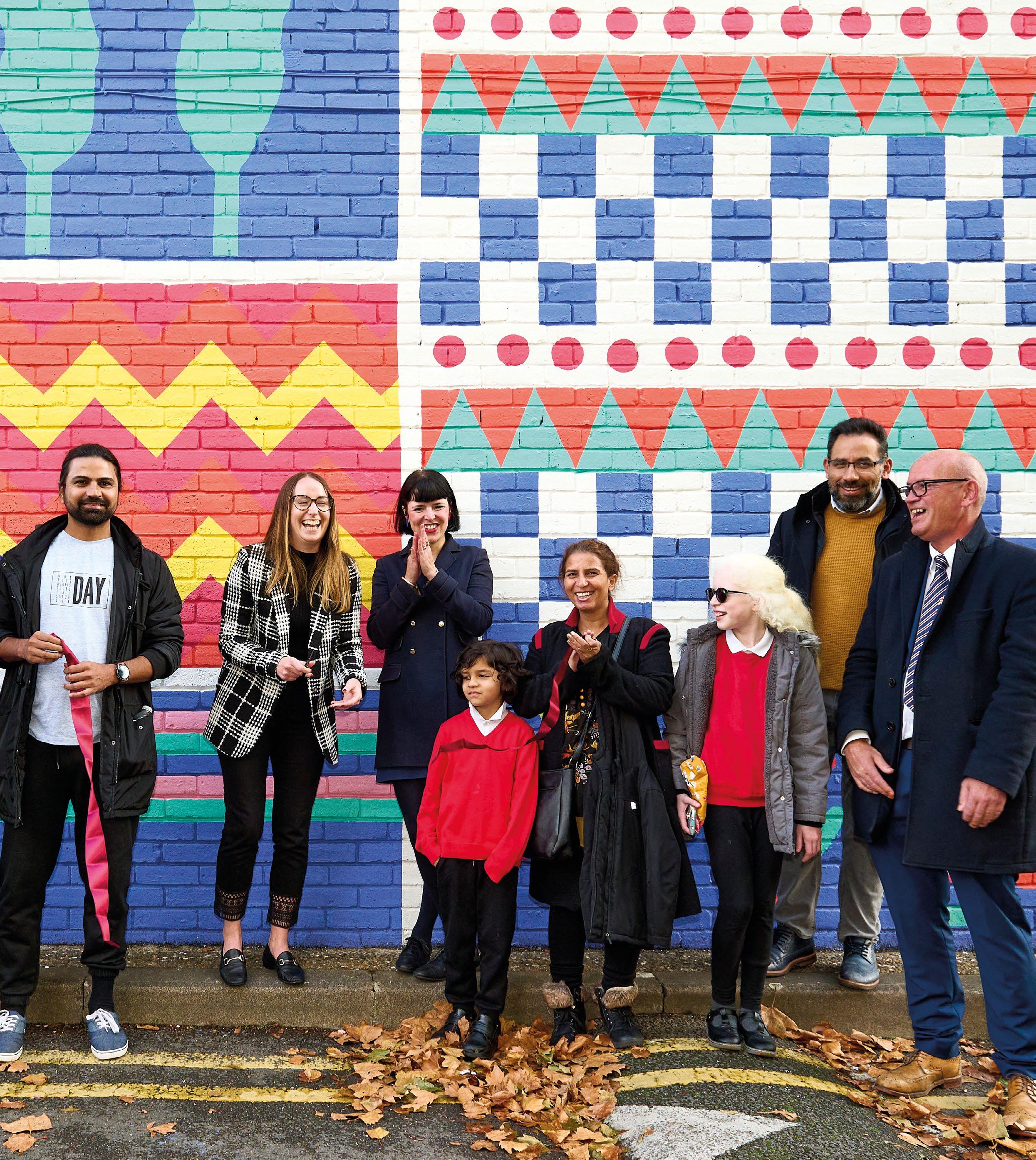
ESG Report 2022
– The Hill Way
Sustainability
 Andy Hill OBE Group Chief Executive
Andy Hill OBE Group Chief Executive



 Andy Hill OBE Group Chief Executive
Andy Hill OBE Group Chief Executive
Our vision is to be the UK’s leading, most trusted housebuilder, creating exceptional homes and sustainable communities.
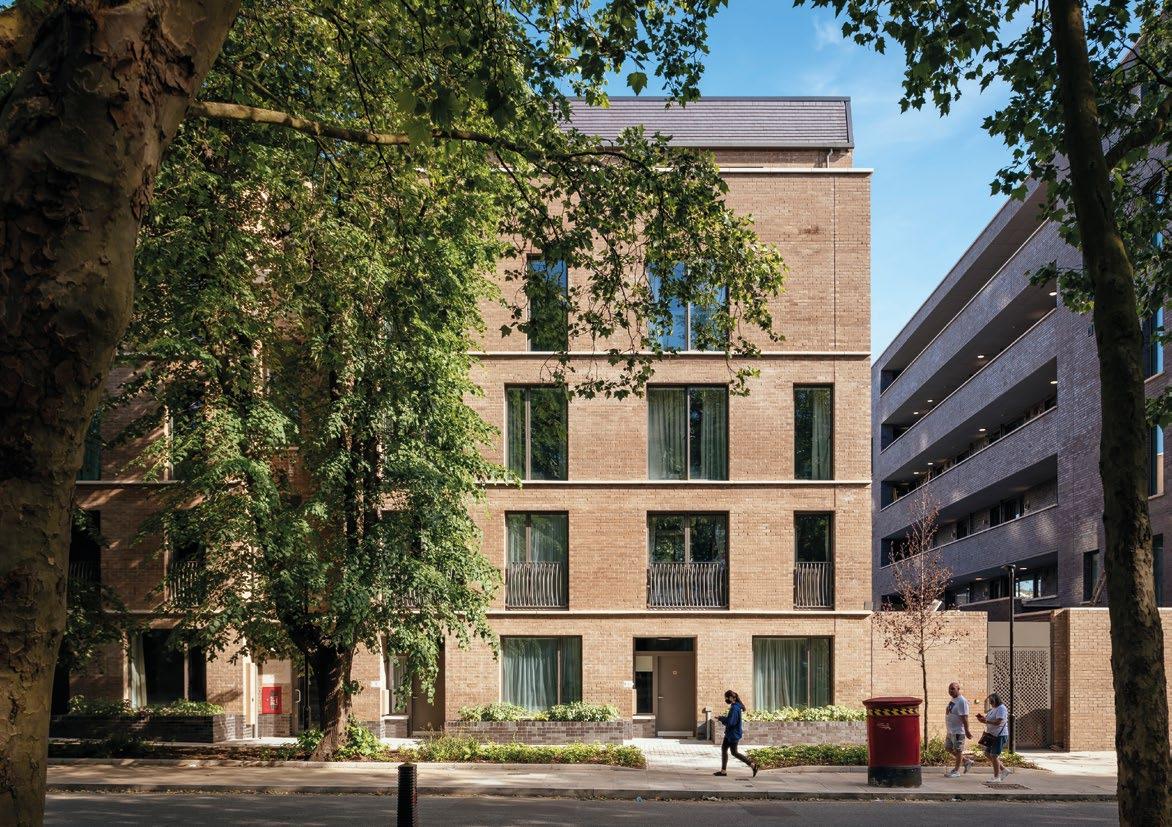
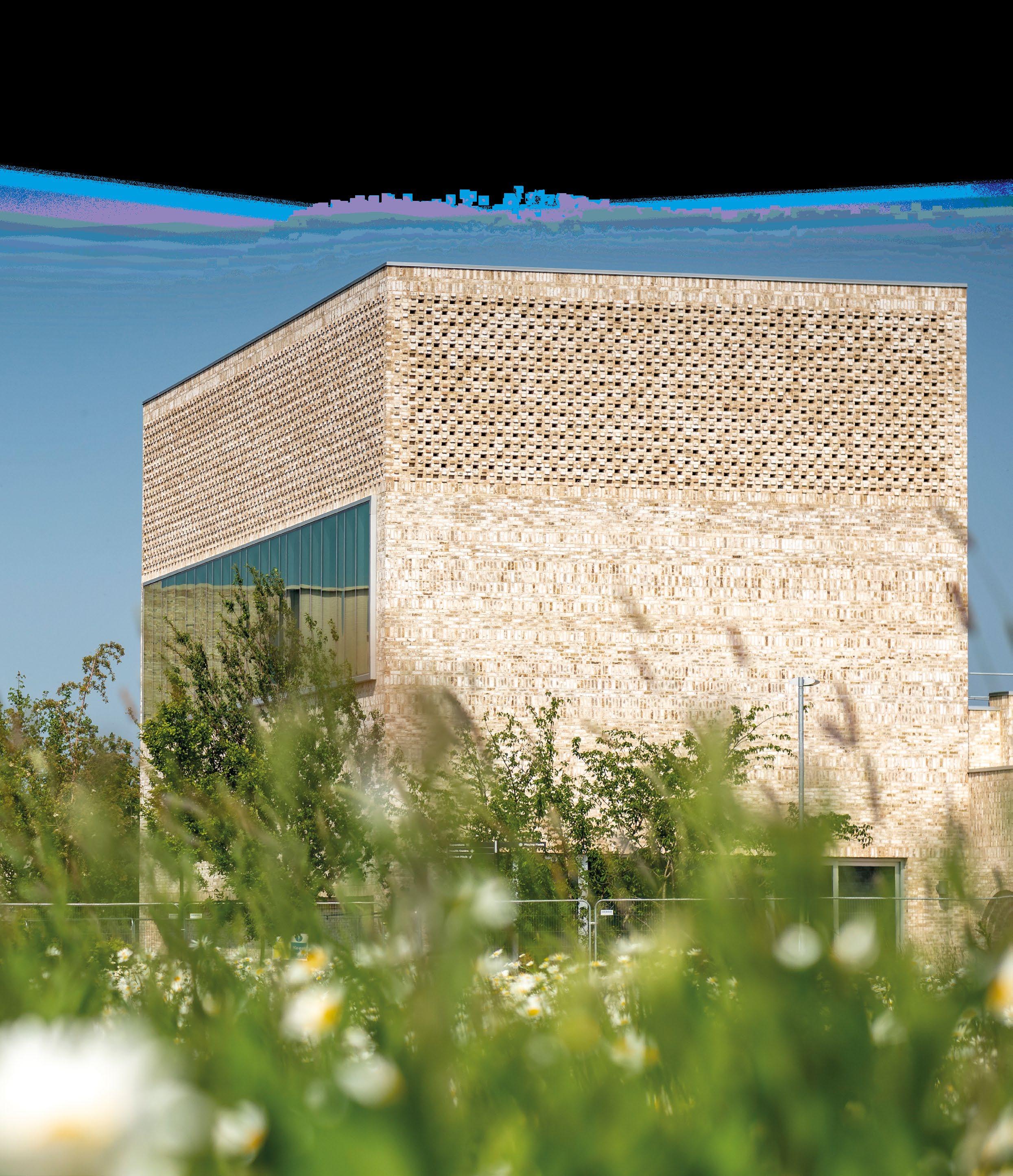
Our family-owned and operated housebuilder began trading in 1999 with a diversified operating model, delivering mixed-tenure homes either as a developer, in joint venture or as a delivery partner. Our business model positions Hill as partner of choice for both the public and private sectors. The Hill Way underpins our culture: we do what we say; we take decisions for the long term rather than prioritising short-term profits; and we treat our people, clients, and other stakeholders as we would expect to be treated ourselves.
We find ourselves trading against a backdrop of significant geopolitical tensions, inflationary headwinds, an uncertain UK political landscape and a scale of regulatory changes not seen for decades, along with the cost of living crisis, steadily increasing interest rates and the possibility of a recession. Positively, in November 2022, the COP 27 UN Climate Change Conference in Egypt revisited and consolidated the importance of setting net-zero pathways. In addition to this, the COP15 Biodiversity Conference, in Canada in December 2022, agreed to halt biodiversity loss by 2030 – we are committed to each.
Despite the obvious challenges, I am pleased to announce we have posted revenue of £716m (£753m: 2021) and net profits of £65.6m (£65.1m: 2021) for the year 2022. We completed 2,203 new homes (2,318: 2021), of which 46.1% (47.7%: 2021) are affordable homes, which is important given the continuous undersupply of new homes and the challenges of a Just Transition. Furthermore, we have expanded our development pipeline to some 12,300 plots (8,300: 2021) and we continue to progress our ambitious five-year business plan to increase turnover to over £1.2bn by 2025.
We are well-placed to achieve those objectives with a diversified business model, a strong balance sheet and an ambitious Environmental, Social and Governance (ESG) strategy to take us to net zero. During the year, we have endeavoured to keep our people and supply chain safe on our sites and have met the vast majority of our ESG objectives. We are setting out in this report a detailed 2030 roadmap, underscored with a more comprehensive suite of ESG commitments.
I am optimistic for our business. We have excellent people with experience in managing risk through innovative good practice and, importantly, a trusted supply chain that aims to reciprocate sustainable growth.
Pleasingly, we have received a significant number of design and sustainability awards during the reporting period, which is testimony to the resilience and ambition of our people and supply chain. I am also pleased that our EPICS programme (Extraordinary People Inspiring Communities Sustainably) is culminating in delivering a values-based difference for our people and stakeholders, with a specific sustainability focus.
It is encouraging that we continue to meet rapidly changing customer expectation, maintaining our five-star customer satisfaction rating, as defined by the Home Builders Federation (HBF) and the NHBC, for the sixth consecutive year. Additionally, our well-designed energy efficient new homes provide the complementary benefits of improved wellbeing for residents, lower running costs and what we believe will be an increasingly longer-term asset appreciation – a new sustainable homes premium.
Furthermore, we have reset our Sustainability Leadership Group (SLG) and its focus groups to operationalise our first Double-Materiality Review findings. These outcomes have informed our ESG pillars and the integrated 2030 net zero pathways roadmap. Compliance with the emerging 2025 Future Homes Standard (FHS) is informing the most noteworthy changes to our Environmental and Governance pillars.
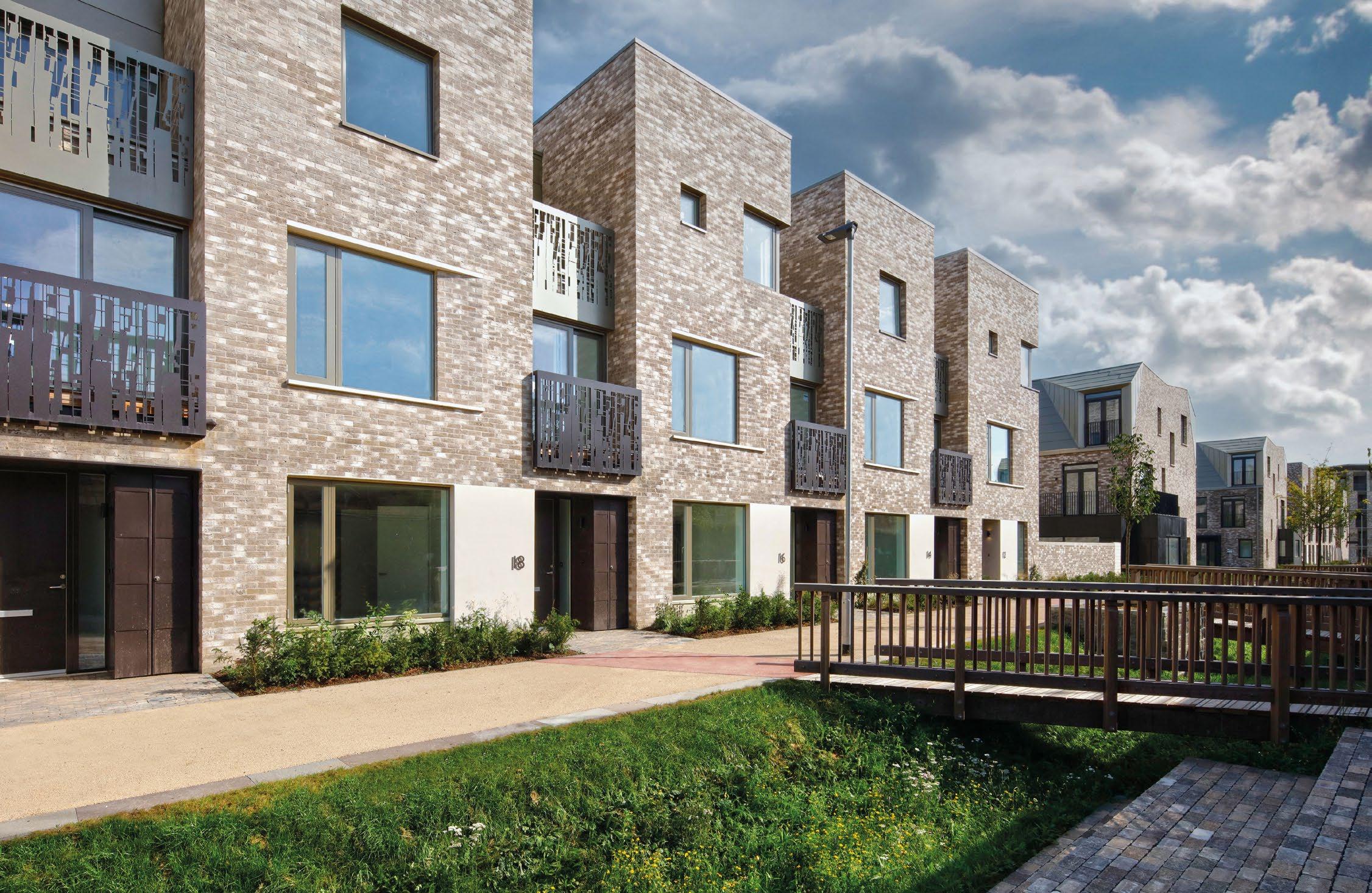

Our Social Value pillar and outreach programme continue to positively impact on the communities in which we work. In addition, our improved governance systems help manage risk and improve public disclosure. For example:
We have made timely progress in meeting the emerging expectations of the FHS through our application of certified Passivhaus homes, Active Homes and equivalent performance standards. We have reduced our scope 1 and 2 greenhouse gas emissions by 40.4% and are achieving Biodiversity Gain standards in advance of the Environmental Act objectives. Also, we are increasing the use of onsite renewables.
During the year, we delivered £358.8m of social added value. We continue to make good progress in deploying Foundation 200, our £15m charitable initiative to deliver 200 purpose-built modular homes to homeless charities and local authorities by 2025. To date, this commitment has culminated in a social return on investment (SRoI) of £1.88 for every pound invested and improving the quality of life of homeless people.
We improved our NextGeneration sustainability benchmark ranking from sixth place to fifth, consolidating our position as the leading private company in the sector. For the first time, we have completed a Task Force on Climate-Related Financial Disclosure (TCFD) Statement. We are also publishing our first Principal ESG Risk and Uncertainties Register and a range of new ESG related policies.
On a personal note, I would like to record my thanks to all my colleagues who made a significant contribution to Hill during 2022 and are committed to continuing our responsible growth story.
Please share your feedback on this report at ESG@Hill.co.uk so that we can continuously and responsibly improve our ESG strategy, our business and its outreach through the rest of this decade and beyond.
Andy Hill OBE Group Chief Executive 31.03.2023 Many of our developments incorporate cycle paths and links for car-free travel.In 2021, we published our ESG pillars and goals, progressing our vision to be the UK’s leading, most trusted housebuilder, creating exceptional homes and sustainable communities. Accordingly, 2022 is the first full year of embedding and operating the following commitments across our whole company.
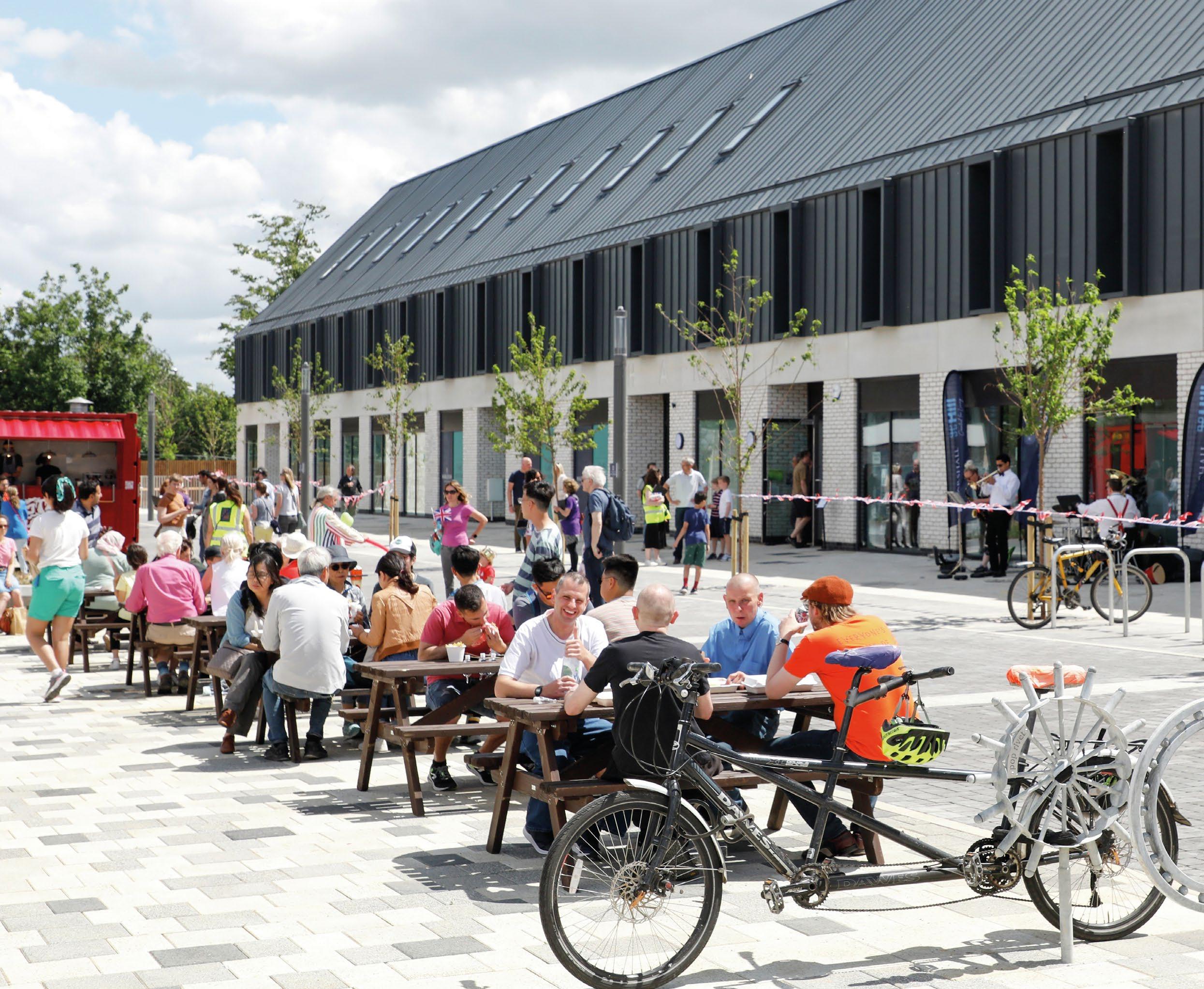
• Creating net-zero carbon homes
• Taking care of our natural resources
• Reducing our environmental impacts
Click here to view 2020-2030
ESG Roadmap
• People come first
• Communities and customers
• Tackling homelessness
• Strategy and responsible business
• Reporting and assurance
• Future proofing
It is pleasing to note we are making good progress across each of the pillars and their goals – as can be seen in the highlights – along with our key performance indicators (KPIs) update. For the first time, we are publishing a more detailed strategy to 2025, and a broader set of commitments to the end of the decade within our 2030 Roadmap. We have also backcast our 2020 commitments to provide a more rounded insight into our appetite for innovation.
According to industry observers, the sector is subject to more significant policy and regulatory change and emerging legislative amendments and consultations than it has been for more than 30-years. For example, the National Planning Policy Framework (NPPF) is subject to noteworthy alterations, while the publication of the interim (2023) FHS, and the full standard in 2025 is expected to bring transformational change to the sector. The latter is being progressed through the pan-industry supported Future Homes Hub (FHH). Furthermore, interrelated Approved Documents Building Regulations and Good Practice Guidance are anticipated. We were early adopters of CP1 Heat networks: Code of Practice for the UK (2020), realising the importance of adding value for our partners and investing wisely in good quality infrastructure.
These known and evolving legislative revisions have significantly informed our ESG pillars and the integrated 2030 pathways (2030 Roadmap). Compliance with the emerging FHS Framework is informing the most noteworthy changes to our Environmental pillar. Our Social Value pillar and outreach programmes continue to achieve significant success, and our improved governance systems help manage risk, improves public disclosure, and has informed our inaugural Just Transition statement.
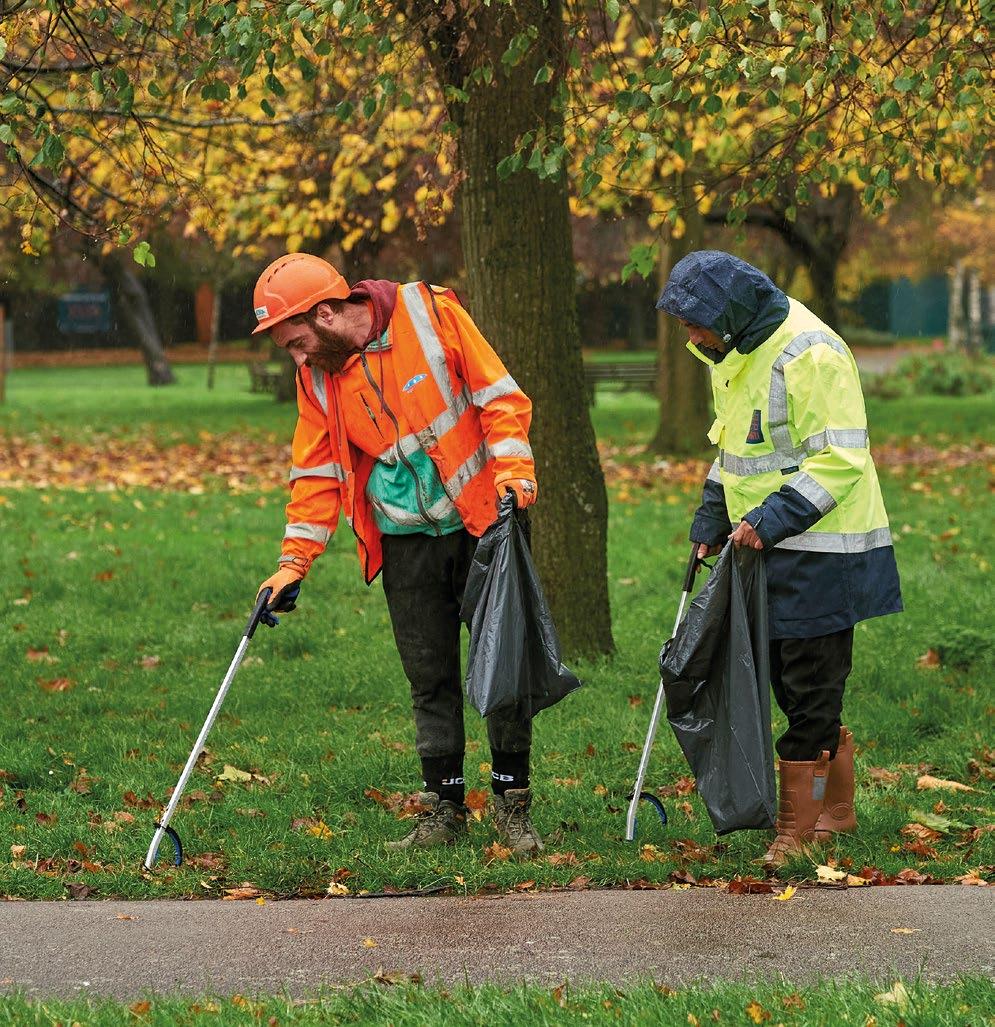
£716m turnover (£753m: 2021)
£65.6m net profit (£65.1m: 2021)
2,203 new homes delivered (2,318: 2021)
46.1% affordable homes (47.7%: 2021)
85 average SAP rating (85.45: 2021)
34.14% average Biodiversity Gain score (25%: 2021)
97% of waste diverted from landfill (93%: 2021)
£358,802,656 social added value (£264,410,985: 2021)
87 SoloHaus (including Foundation 200) homes delivered (82: 2021)
754 Staff volunteering hours (482: 2021)
92.2% customer satisfaction rating (94.4%: 2021)
5th place in the NextGeneration sustainable housebuilder benchmark (6th 2021)
1st TCFD statement published
During 2021, we undertook our first Materiality Matrix Review. This was an internal exercise to help us gauge the current and emerging ESG risks facing the Group and the sector.
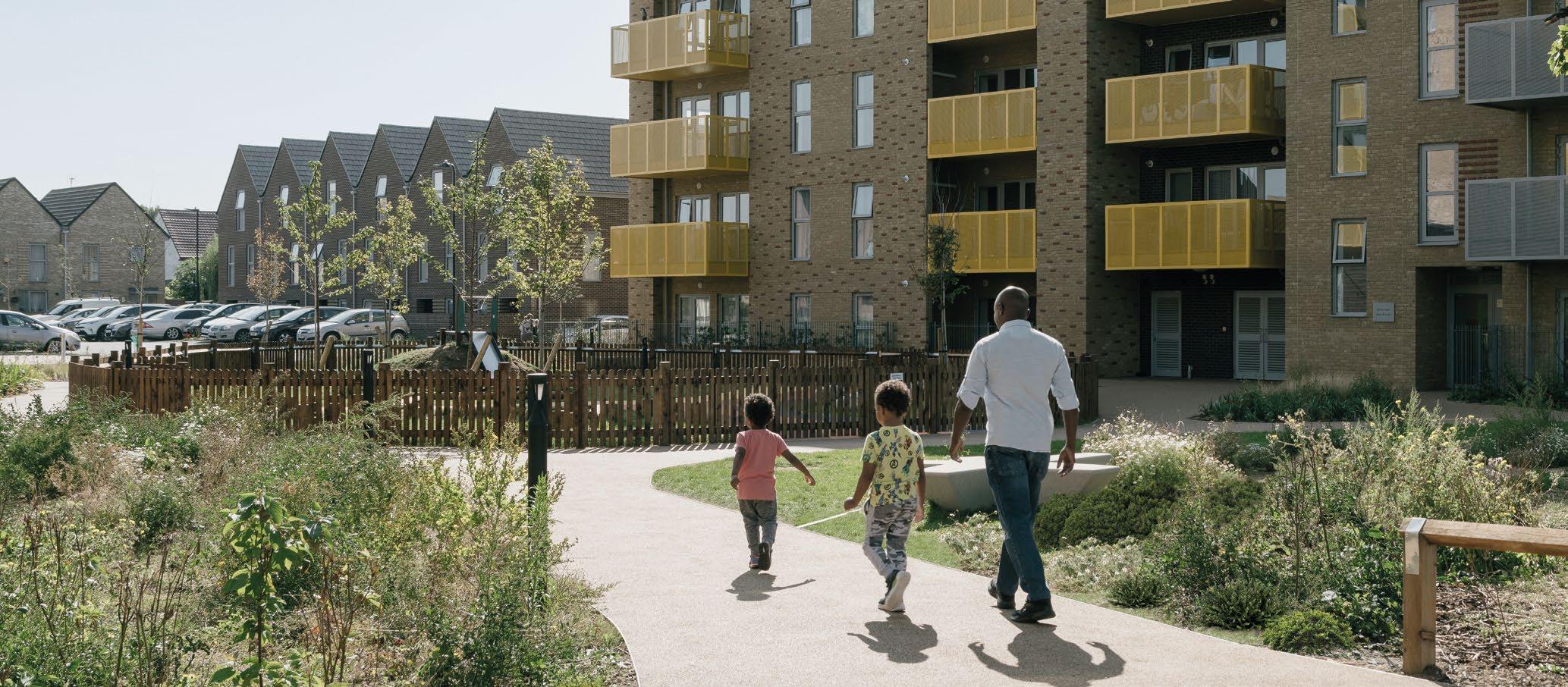
Whilst this provided important insights to help us inform our ESG strategy to 2030, and its short-term operational plan, we thought it prudent to gain more visibility and transparency on our stakeholder sustainability requirements and priorities. Accordingly, for the first time we undertook a Double-Materiality Review in late 2022 to shape the company's strategy and commitments for the remainder of our five-year business plan cycle (20232025) and beyond to 2030.
This tripartite approach took the form of a review of existing and future legislation in the UK; a review of industry best practice and regulations; and a best practice sustainability review. We invited more than 850 individuals and organisations to participate in a survey. The key stakeholder groups included around 50 clients, registered social landlords (RSL), local authorities and investors, our top-50-supply chain companies by turnover, and the Group’s circa 750 employees. It is important to engage fully with our people and we believe it is timely for the review to replace the previous staff sustainability survey. Each stakeholder was anonymously asked to rank
each of the 18-ESG issues on a scale of significance and verbatim responses were also encouraged. During 2023, we aim to hold roundtable discussions with stakeholder groups to gain even deeper insights into priority themes. We believe this approach will provide reciprocal value for all parties and help inform the Group’s advocacy work, as set out in its governance structure.
The outputs of the review are captured in the following materiality priorities table. Whilst the issues are dispersed, we recognise each has significant importance to our stakeholders and Hill’s license to operate. Hence, during 2023, we will manage the opportunities and potential risks of each issue and its potential impact on our growth plan and ESG strategy. We expect more progressive corporate funding models and customer mortgages to be informed by additional ESG commitments. Furthermore, this approach helps us prepare for the CSRD (Corporate Sustainability Reporting Directive) that comes into effect from 1 January 2024 for companies employing over 500 employees. We are already subject to the non-financial reporting directive, with reports due in 2025.
The findings of the review have been integrated into a new Principal ESG Risks and Uncertainties Register and Hill can make a positive impact on 15 of the 17 United Nations Sustainable Development Goals (UN SDGs). We also believe we can make a long-term positive contribution to society through supporting a just transition. Accordingly, to the World Benchmarking Alliance, sustainable development can only be achieved by striking the right balance between economic, environmental and social components, including supply chains and communities. The Hill Group is developing this balance through its 2030 Roadmap. In summary, we have structured our inaugural Just Transition statement in accordance with the Paris Agreement. Harnessing UN SDGs provides a global connection to our ESG commitments and is an important way of embedding sustainability into our 2030 Roadmap and KPIs, although we have far more detail to develop and disclose in the medium and long terms.
The Group is well-positioned to manage strategic and operational ESG risks for our stakeholders and improve our customers’ quality of life. Whilst the emerging Future
Homes Standard Framework raises a range of challenges for the sector, our research and development so far gives us confidence that the criteria will be deliverable. The medium to long-term timeframes will provide the opportunity for us, along with our supply chain, to build capacity, knowledge and resilience to build-at-scale, in accordance with emerging quality standards and balanced with appropriate commercial returns.
The Principal ESG Risk and Uncertainties Risk Register forms part of the re-purposed Environmental and Social Value Focus Groups and the Sustainability Leadership Group (SLG). Our ESG champions form the membership of the focus groups. Strategic ESG is overseen through the SLG that reports to the Executive and Risk Committees and the Group Holdings Board. ESG reports are prepared and disclosed quarterly throughout the reporting year. To ensure the Group is preparing the next generation of employees, we have introduced an ESG partners tier to our governance structure. This vertically integrated structure is helping us to manage risk and grasp the opportunities that the Just Transition brings.
We believe that placemaking positively benefits the physical, social, emotional, and ecological wellbeing of people and their locations.
We collaborate closely with communities and partners to achieve quality placemaking through a series of bespoke engagement strategies relevant to each location, whether it is a city centre infill scheme or a greenfield garden suburb. We always aim to create a positive, long-term vision for both existing communities and new residents with strategies informed through consultations, resident ballots in urban areas and neighbourhood plans in rural locations. Our commitment to placekeeping is supported by partners and social registered landlords and, at Marleigh in Cambridge, where the public realm is being held in perpetuity, through the Land Trust. This knowledge is helping us respond to the amendments to the Environment Act 2021, which includes the introduction of the Biodiversity Gain (BG) trajectories and 30-year management plans. Around 73% of our projects are developed on brownfields, while we are also planning schemes (circa 27%) in sustainable greenfield locations.
The 2025 FHS requires every new home in England to produce 75% to 80% less carbon emissions than those currently being built. These dwellings will be zerocarbon-ready by switching off fossil fuels and become zero carbon as the grid decarbonises. In readiness for these changes, back in 2021, we voluntarily decided to design new schemes with an enhanced fabric-first standard and integrated low carbon electricity and air source heat pumps. A regulatory stepping stone to the zero carbon ready target comes into place from June 2023, with these homes required to deliver 31% less carbon emissions. Our early adoption of these good practice standards has ensured we can manage the FHS trajectories effectively. These legislative changes were introduced during 2022, in a suite of Approved Documents Building Regulations, Parts F, L, O and S, colloquially termed FLOS.1 Of further note, the COP27 UN Climate Change Conference in Egypt in November 2022, revisited and consolidated the importance of setting net zero pathways.
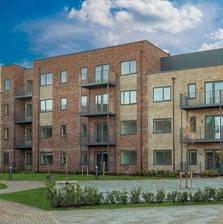
These policy and regulatory changes aim to balance both CAPEX risk and OPEX benefits. In advance, in 2020, we trialled and adopted a range of certified Passivhaus and Active Homes, and equivalent performance standards, research and development schemes. Each home in the trial achieved between 75% and 80% of the reduction target for low to high density homes and apartments. This practical delivery experience, and the ongoing Post Occupancy Evaluation (POE) at eight schemes, is providing us with invaluable knowledge and gives us confidence that we will meet the FHS in advance of its introduction in 2025. There is a short and medium-term cost premium, along with supply chain capacity and scale-up risks, that must be mitigated before the sector as a whole is able to mainstream the delivery of these homes and place.
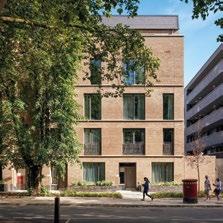
Our developments are becoming more cognisant of predicted physical and transitional climate change risks, as recognised in our TCFD analysis. Our homes’ super and sub-structures are gradually responding to climate change risks, including passive and enhanced thermal design (meeting Part F and L 2021), overheating (responding to CIBSE TM:54 and 59 and Part O) and daylighting strategies to maintain resident comfort through the year.
The Standard Assessment Performance (SAP) rating measures an improved regulated carbon reduction trajectory. Our objective was to achieve 87:2022 and then a 1-point incremental uplift to meet 90:2025. For the year, we achieved an 85 SAP rating, against the industry’s average at 84. We are forecasting to be below the trajectory of our Sustainability Linked Loan (SLL) until 2024. Notwithstanding this, we are on track to improve our SAP scores across our portfolio, given we pivoted away from installing fossil fuel gas-boilers in our homes from 2021. However, without securing new revised planning consents and / or regulatory approvals,
this innovation lag means our SAP scores are below the trajectory. But we are preparing positively in readiness for the FHS.
The new homes we completed in 2022 produced 2,132 t CO2 e (1,823 t CO2 e:2021). The accepted protocol is to multiply this by 60 to give a projected total for regulated operational carbon emissions over the notional 60-year lifetimes of those homes. This gives a total of 127,953 t CO2 e (109,413 t CO2 e:2021) contribution to our carbon footprint for 2022 (classified under scope 3 completed homes energy in use), equating to 0.92 t CO2 e (0.89 t CO2 e:2021) per dwelling.
During 2022, we developed solar form design guides and Passivhaus playbooks. In 2023 we will further develop this knowledge into residential pattern books to enable us to create appropriate low-carbon pathways to achieve 2025-2030 transition strategies. Currently, all our homes are designed to optimise water usage of 105 litres per person per day (lpppd), compared to a typical UK resident’s use of 151lpppd and Building Regulations
Approved Document Part G2 standards of 125lpppd. We have also delivered homes in Cambridge that achieve 100lpppd. In parallel, we are developing a better understanding of whole-life carbon (research-based homes achieving between 696kgCO2e/m2<746kgCO2e/ m2) and circular economy strategies (scoring 28% building circularity) to inform the aforementioned pattern books.
In principle, each of these examples indicates FHS compliance, which is helping us to develop our knowledge and, importantly, to better inform our supply chains. This involves both existing traditional procurement routes and our significant investment in modern methods of construction (MMC) in fusion steel framing (Fusion) and volumetric modular (VML).
Our increasingly energy-efficient new homes not only provide comfortable living through the seasons and mitigate overheating, they also help reduce residents’ bills by up to £2,600 per annum3. In 2023 we will continue our collaboration with the FHH to help quantify the new sustainable homes premium for climate-proofed places and homes. According to HomeViews and EE report, Sustainability – The Residents’ Perspective’ October 2022 – 72% of residents said sustainability was important to them, an increase from just under 70% in 2021. Such measures consolidate the importance of our ESG innovation programmes and, for the sixth consecutive year, we have delivered five-star levels of customer satisfaction, as recognised by the HBF and the NHBC in their National New Homes Customer Satisfaction Survey.
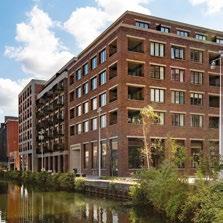
Fish Island Village, Hackney Wick, East London.
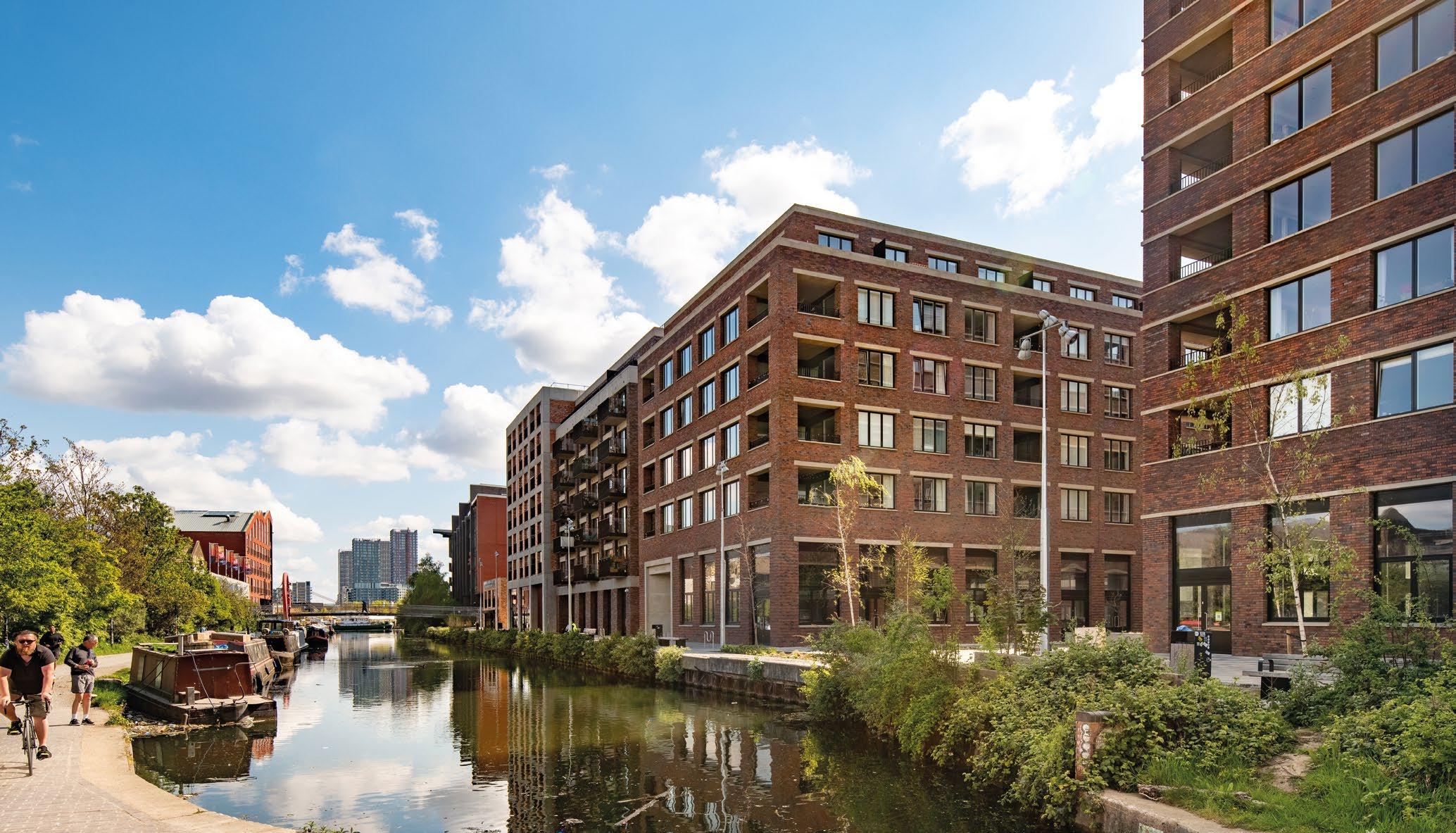
At Hill, we create inspiring award-winning places for people to live, work, play and visit. Through landscape-led placemaking we aim to create a sense of place, to foster community, to improve wellbeing and promote a better quality of life.
We want to give our residents a sense of connection to the places they live in, where they can be close to nature and amenities, such as nurseries, shops, and sustainable transport options.
We do not believe in developing identikit places and buildings, we create communities that reflect a unique identity in response to their social and cultural heritage and character. During the year, we adopted and applied the Building for a Healthy Life (BHL) design tool across four new schemes (garden suburbs and a regeneration) to help create places that are better for people and nature. BHL is also fully ingrained in our design and sustainability briefing documents and processes to ensure all our projects are well-designed. According to Design for Homes, a Built for Life home should offer a higher quality of life and be a better long-term investment.
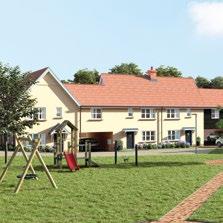
Chesterford Meadows, Essex.
We are future-proofing new schemes and homes through climate change, adaptation, and resilience strategies. This includes public realm sustainable urban drainage systems (SuDs), subterranean engineered solutions and green and brown roofs to mitigate surface water flooding risks.
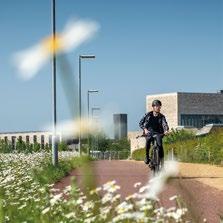
Knights Park, Eddington, Cambridge.
The Environmental Act 2021 sets out a 10% BG for new projects being progressed through the planning system from late 2023. However, as a result of the global loss of biodiversity and habitat, the COP15 Biodiversity Conference in Canada committed to halting biodiversity loss by 30% by 2030. It is a concern that the UK has the highest losses amongst the G7 countries.
Hill has a portfolio objective to achieve 20%:2022 BG score and thereafter 5% incremental uplifts to meet 30%:2025, far in advance of the COP15 agreement. Whilst this a particularly challenging obligation, to date we are on target and we believe these commitments will help, in a small but important way, to reverse the UK decline. This approach will also enable us to prepare for the future Task Force on Nature-related Financial Disclosure (TNFD) compliance from 2024, if the guidance is published in September 2023. We are proud to have planted some 1,492 trees in the reporting period to improve the quality of the public realm and, in time, to provide summer shading and to help improve air pollution.
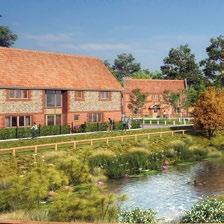
Heartwood, Docking, North Norfolk.
As a responsible business, Hill is committed to its net zero pathway and achieving net zero carbon in our business operations and in the homes, we build, in advance of Government trajectories.
We will reach net zero carbon in our Scope 1 and 2 business operations and net zero operational carbon in the homes we build by 2030. A summary of greenhouse gas emissions 2020-22 is set out below.
Other emissions
Scope 3 completed homes energy in use (t
Reporting Methodology: For the third consecutive year, we have followed the Governments 2019 Environmental Reporting Guidelines and the 2021 Conversion Factors for Company Reporting. Our footprint has been calculated in line with the Greenhouse Gas Reporting Protocol – Corporate Standard and ISO 14064 – part 1. We report on an operational control basis, meaning that our data covers energy use from premises where we have the authority to introduce and implement operating policies.
For consistency, our reporting scope covers all construction sites, including temporary welfare accommodation, mobile plant, both Hill and contractors’ fuel and our main operational offices. We have allowed for all forms of contracts, including joint ventures. We have not included for the two off-site manufacturing facilities where we have a 50% joint venture interest.
We believe our scope 1 and 2 emissions should follow a steady downward trajectory post-COVID-19 lockdowns and a rise in emissions during 2021. During the reporting period, we achieved a 40.4% reduction in scope 1 and 2 emissions. This performance is a result of the introduction of efficient site measures, including the move from diesel fuel to green biofuels from the beginning of 2022, despite the cost premium. In addition, we purchased green renewable energy tariffs across our business, and are pivoting towards a greener car fleet and a complementary salary sacrifice scheme.
Our scope 1, 2 and 3 GHG emissions, excluding completed homes energy in use, have reduced by 31.15%. Homes completed during the period produced 0.92 t CO2 e (0.89 t CO2 e:2021) per dwelling. We are beginning to undertake whole-life carbon and circular
economy assessments on selected projects to reduce completed homes energy in use, although further work is required in this area to ensure we achieve our longerterm 2030 Roadmap objectives. During 2023 we will commence a Science Based Targets initiatives (SBTi) review to better understand our upstream supply chain and end-of-life impacts of our completed homes.
We are committing to this holistic approach, as SBTi defines and promotes best practices in emissions reductions and net-zero targets in line with climate science. Gaining clarity through the business plan cycle will be important as we head towards our objective of net-zero carbon. This will, of course, be challenging against the planned growth of the business, increasing to a projected £1.2bn in 2025.

Hill is committed to creating real tangible social value today and for the future.
In 2021, we achieved over £264,410,9854 of value, circa 35% of our annual turnover, which created a benchmark for our Social Value strategy, to target at least 25% of lasting community and societal benefits, across our business by 2025. Hence, it is pleasing to note we have created £358,802,656 of value, circa 50% by turnover during 2022 – and we are on target to meet the 2025 milestone.
To achieve our vision, we place our people at the heart of everything we do. The ability to feel connected starts with The Hill Way. Our People Come First Focus Group provides support programmes and initiatives, including health and wellbeing, training, and volunteer programmes. We aim to be an employer whose people reflect the communities in which we work.
During the year, our partnership with Women in Construction (WiC) expanded beyond Cambridge to East Anglia, London and Bristol.
The launch of two new programmes to increase diversity in the business included the Hill Academy and our support of the Future of London’s Emerging Talent programme.
The Hill Academy is designed to open routes into the business for those who may not have the means or desire to achieve a degree qualification, such as a career changer, WiC candidate, long-term unemployed or an ex-offender. The Academy programme includes a two-week work placement before moving into a site assistant role – we recruited five new staff during the year. On completion of their probation, the candidates will study towards an NVQ Level 4 Construction Site Supervisor apprenticeship. Four colleagues chose this route.

Hill Ambassador Programme –Ellen Dugan.
Hill has supported the first cohort of the Future of London Talent programme, an inclusive, cross-sector group for Black Asian and Minority Ethnic (BAME) entrants to the built environment sector, specifically in housing and regeneration. Each candidate receives a salary in excess of the Real Living Wage and completes three placements with private and public sectors employers.
Aliya, our first placement started in January 2022, spent nine months with our development team at St Ann’s Haringey, and then six-weeks on site at Wood Street in her local borough of Waltham Forest. Kinta, our second placement, joined us after a public sector placement, and worked on our Teviot project in Tower Hamlets before gaining a permanent role in local government. A third placement is due to begin in April 2023.
Our three-year WiC partnership in Cambridge provided a 400% social return on every £1 invested. This model has enabled our divisions to broaden their geographical reach and social value through the WiC regional community hubs across East Anglia, including Cambridge and London. And in collaboration with our client, The Guinness Partnership, a WiC programme has been launched in Bristol for the first time.
In Bristol, the women received one-to-one advice, guidance and mentoring, technical training in health and safety and CSCS cards from The Restore Trust. Plus, two weeks’ work placements with Hill and Guinness sub-contractors on site at McArthur’s Yard and across the city. Head of Business Development for WiC, Jacqui Wordsworth, said:
“Huge thanks to The Hill Group, The Guinness Partnership and The Restore Trust for helping us create such a fantastic employment programme. It was inspiring to work with such an engaged group of women and celebrate their success at the event.”
During 2022, we have progressively reshaped our resident engagement offering and evolved our Social Value strategy to 2025 in support of our vision: “To be the UK’s leading, most trusted housebuilder, creating exceptional homes and sustainable communities”.
Deliver on our promises and commitments set out in our Social Value strategy. Setting a target of 25% of our annual turnover to be achieved as added social value by 2025.
Homes are more than just the building; they are the places we grow as individuals and families. At Hill, it is important to focus on placemaking, to ensure our residents have happy, healthy and safe lives.
Our integrated approach to social value and regeneration aims to ensure new development leverages positive societal value and wellbeing for existing residents, the neighbourhood and future neighbours. The focus group drives strategy and innovation across four social value themes.
Our communities should enable people to feel connected and included. Providing opportunities for people to live and work locally, as well as to grow local businesses and social enterprises providing careers for future generations to come.
Post the COVID-19 pandemic, we have reconvened schools’ engagement and careers events, along with individual and group work experiences. Each approach enables us to engage with a comprehensive and diverse cohort of young people to promote the career opportunities we, with our supply chain can offer in the built environment sector. Our objective is to achieve 8,500 school-hours of engagement per year and 500 work placement weeks by 2025. In recognition of our commitment to new Industry entrants, we aim for 7.5% of Hill and supply chain employees to be apprentices.
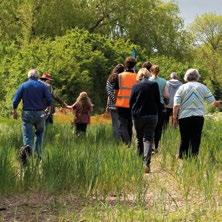
Hill works with partners and our supply chain to provide entry level and upskilling opportunities throughout the year. As an example of excellence, we worked with K10 and Cambridge City Council to fund 18-local apprentices hoping to become qualified plumbers, electricians, carpenters and plasterers.
Apprentice Lewis Timmins commended Hill for the programme:
“I'd also like to add how grateful I am for the apprenticeships. It's especially good in my area as it's very rural and lacks many opportunities.”
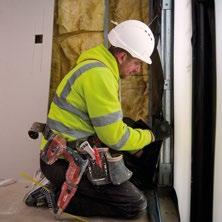
Hill has an average of 24% local labour (within 10 miles) across all our projects, plus 9,019 earn as you learn (EAYL) weeks.
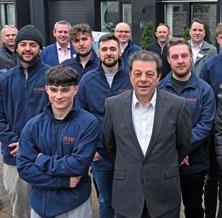
Hill recognises that barriers to employment can be exacerbated by childcare costs, the cost-of-living crisis and increasing income gaps, which can make accepting employment challenging. Through an initiative with Camden Council, we provided £4,500 to help close the gap and transition families to employment.
The building environment sector’s supply chain consists predominately of small and medium enterprises (SMEs). Hill is passionate about supporting these organisations and also local and minority-owned businesses. To help achieve our commitment we hold a variety of engagement forums, including:
• Meet the Buyer events for local businesses to understand our project pipeline and prepare to join Hill’s preferred supplier list.
• Regional supply chain events for existing supply chain to keep abreast of new upcoming projects and contracts.
• Supply chain awards, our inaugural awards ceremony in July 2022 recognised our partners’ valuable contribution to our delivery, ESG programmes and Equality, Diversity & Inclusion (EDI) activities.
Social enterprises are becoming increasingly important in diversifying and responsibly growing a purpose-driven supply chain. Organisations such as Community Wood Recycling and The Phoenix Trust, deliver invaluable sustainable and social value benefits into Hill’s projects and the local community.

By 2025 we aim for 60% of our supply chain to hold Constructionline Gold level status and for Hill to provide a minimum of 210 hours of business support and mentoring to SMEs and voluntary, community and social enterprises (VCSE). We will contract with a minimum of one social enterprise on every project. During 2022, Hill joined the Supply Chain Sustainability School (SCSS) to gain access to training resources and relevant current and emerging industry collaborations. We will share with our supply chain the benefits the SCSS offers.
Community belonging is at the heart of Hill’s engagement and delivery plans, primarily achieved through local school and community fun days, events and projects. Importantly, our social value and community team provides a single point of contact for our stakeholders, ensuring our projects deliver reciprocal benefits for each invested party. On selected projects, formalised resident steering groups are structured to capture and action, priority areas and improvement suggestions.
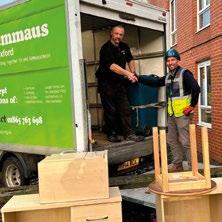
At our Teviot Estate project, Hill has created a social value resident champion role. This colleague sits on the Social Value Programme Board to represent the residents’ voices and this is successfully informing strategic and nuanced collaborative decision making. Each of these bespoke approaches provides Hill and our partners with invaluable knowledge to support regeneration and new developments across a diverse range of project typologies.
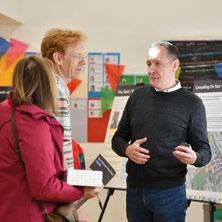

In 2021, we became a founding partner of the community funding platform ActionFunder and in 2022 we created our first fund of £12,000 to donate to qualifying community projects in the Bristol area. To secure funding, the applicants were assessed by a review panel consisting of Hill, The Guinness Partnership and donating sub-contractors. The following community organisations each secured a proportion of the funding:
1. Helping Homeless Believe, Hot Food Service – £2,000.
2. Changes Bristol, Reducing Social Isolation, and Improving Mental Wellbeing – £2,500.
3. Alive Activities, Wellbeing through Community Gardening – £2,500.
4. Bristol Autism Support, Family Wellbeing Activities –£2,500.
5. The MAZI Project, Amazing Meal Boxes for vulnerable young people – £2,500.
Through ActionFunder we will monitor the beneficiaries of these donations and the wider societal impacts.
It is recognised that arts and culture are important in supporting vibrant diverse communities. Hill has run several art projects to garner positive legacies, including a large community mural at the Teviot estate and a number of art curriculum projects run with local primary and secondary schools. These projects are showcased on our site hoardings and receive positive responses from the residents.
Progress update events and fun days keep residents informed of key project milestones and encourage engagement outside of day-to-day construction activities. In partnership with Powerday, a waste management and recycling sub-contractor, we ran resident pride days during which dedicated Hill volunteers helped residents recycle bulky household items. This type of collaboration also helps keep neighbourhoods tidy and brings people together.
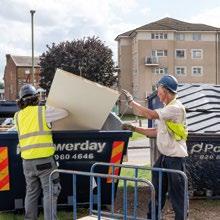
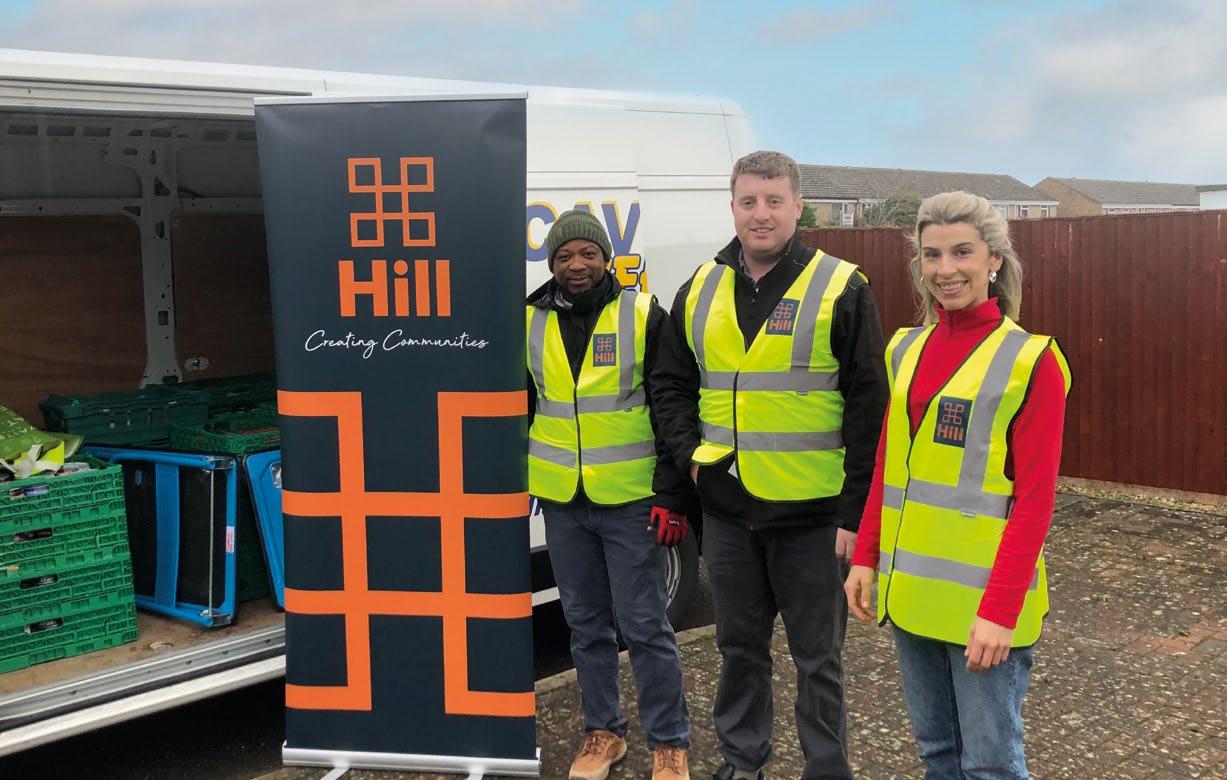
The health and safety of our staff, residents and community is of the utmost importance. Working with the Lighthouse Club, we have been running Help Inside the Hard Hat mental health sessions for our staff and supply chain on projects across our portfolio. The campaign raises awareness of poor mental health within our industry. In the UK two construction workers take their own lives every working day, and stress, anxiety, and depression account for a fifth of all work-related illnesses. We are invested in the Lighthouse Club approach of pro-active support and resources for the construction community, including their 24/7 construction industry helpline, a free app and mental health training.
2022 saw the UK enter a cost-of-living crisis with energy bills soaring and families and communities struggling to cope. In partnership with Powerday, we hosted food banks at our sites. Our staff and supply chain generously donated food and essential items and together we distributed gifts to local community food banks.
Through the summer holidays our Wood Street site team ran cookery lessons for local primary school children and their parents and carers. The team demonstrated how to cook nutritious meals and provided ingredients for them to cook another hot meal at home. Two members of our social value team are trained energy advisors and, in partnership with Warm Hubs, we ran energy-saving advice sessions for residents and directed them to grant providers.
“Everyone who comes to these sessions has a chance to experiment with food at such a young age and learn that food is fun. We also know that these children have eaten today”
Alice, East London Kids Kitchen.Hill has committed to: donate £75,000 per year to charities and community projects; run 75 food bank or furniture poverty initiatives; and support the most vulnerable in our communities through the cost-of-living crisis. Research indicates that a resident’s quality of life is informed by physical, social, and psychological wellbeing and we believe The Hill Way is playing a part in improving neighbourhoods and lives by helping to deliver a just transition.
Visiting a local food bank with food and supplies collected by our teams.In response to the homelessness crisis, in 2019, Hill made its flagship Foundation 200 pledge to gift £15m by donating 200 SoloHaus units to people in need. Since 2020, 52 homes have been installed free of charge in a range of locations in England. To date, 104 of the 200 homes have been allocated. During 2023, in collaboration with local authorities and charities, an additional 62 homes have been allocated to sites on behalf of our partner charities. SoloHaus homes are committed, subject to planning, in Bristol, London boroughs, the Midlands and additional sites across the South of England.
The housing schemes delivered in this way have been gifted to well-established charities, such as the Salvation Army and Emmaus, which have experience of helping formerly homeless individuals. These safe, low-carbon units are helping to alleviate the pressure on temporary accommodation. Residents are provided with wrap-around support by the charities to give them the best opportunity to seek employment, address long-term physical or mental health issues, or otherwise stabilise and rebuild their lives.
Research published by the University of Cambridge found that the type of modular accommodation provided through Foundation 200 had a significant and positive impact on the lives of residents, allowing them a level of privacy and independence which they would not have received in a traditional hostel or emergency housing.
In addition to the original Foundation 200 pledge, we have delivered 173 SoloHaus homes for councils and other affordable housing providers elsewhere in the country. We have installed SoloHaus homes as a turn-key affordable housing solution for the London Borough of Haringey, as well as Stevenage, Ipswich and Dacorum Borough Councils. In Cornwall, Hill has developed a long-term strategic partnership with Cornwall Council to supply SoloHaus homes through an independent delivery programme supported by local contractors. The SoloHaus is now being used as an alternative to hotels, and bed-and-breakfast temporary accommodation, which has become a common form of emergency housing in the area.
Overall, we believe that Foundation 200 and SoloHaus provides a clear pathway to provide affordable steppingstone accommodation to people facing homelessness. Hill will continue to deliver on the original pledge of 200 homes to ensure we play our part in addressing the ongoing housing crisis.
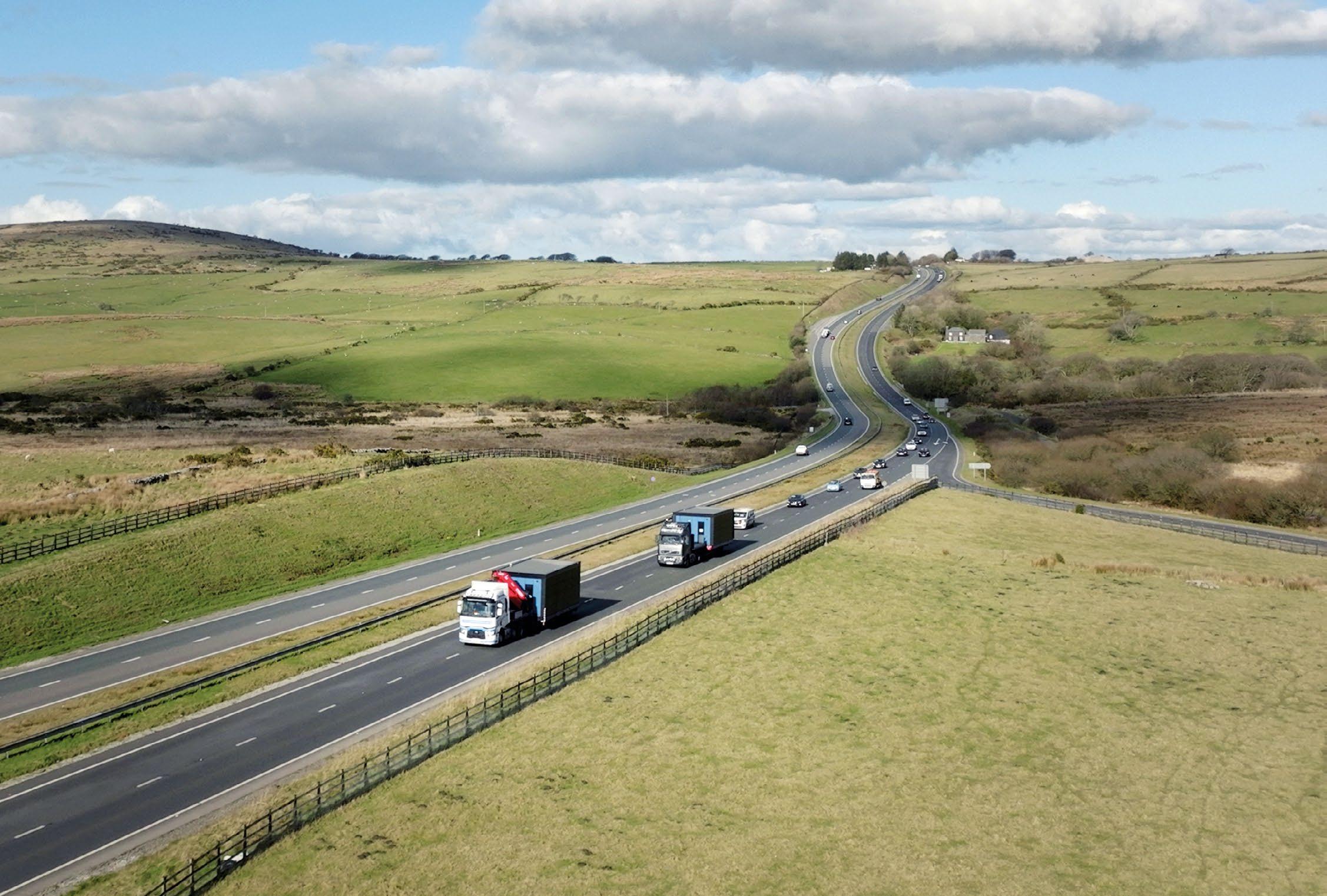
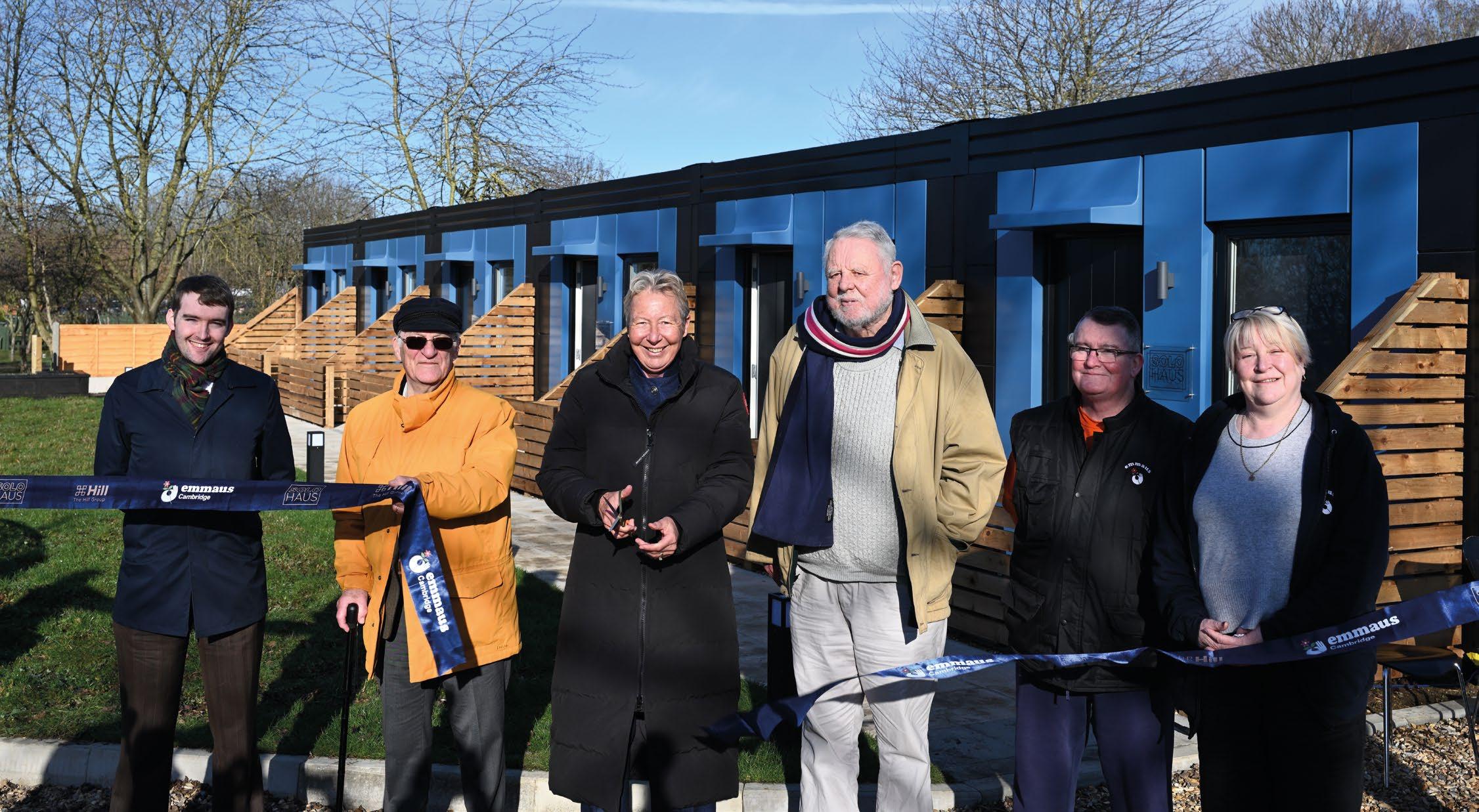
In autumn 2022, Hill commissioned an SRoI report for the Foundation 200 project to help evaluate the full social impact of the homes at two separate geographical locations where residents have been living for a year. These were:
• three dispersed sites in the north and east of Cambridge, housing 16 people, managed by Jimmy’s Cambridge and completed between December 2020 and June 2021.
• a single site in Haringey, with 16 donated homes and a further 17 bought by Haringey Council and completed in December 2021.
The report focused on both the qualitative and quantitative outcomes for the residents of these homes and considered both positive and negative aspects. Positive outcomes included improved mental health, re-engagement with family and friends and being kept out of prison. Some reported a negative issue of feeling more isolated.
The key quantitative outcome suggests that for every pound spent directly or nominally costed to the donated Hill Foundation 200 resulted in a further £1.88 of social value. More importantly, they have had a positive impact on people’s lives with some stating the homes have been life-changing.
“If I wasn’t in the pods I’d just be going around and around the circles – hostel and council placements. I was just always trying to break that cycle. I’d just be chasing dayto-day like you normally are when you’re on the street. The pods give me a future.”
Cambridge Foundation 200 resident.
To optimise the socio-economic benefits of our Foundation 200 pledge, we will set up an employability programme in 2023 to provide training and job opportunities for residents living in the pods and neighbours living within Jimmy’s, a community-based charity in Cambridge providing support and homes for people who are rough sleepers.
We are collaborating with our clients, partners and supply chains to create a diverse range of successful work programmes, including pre-employment training, interview skills, time and money management, health and safety and wellbeing behaviours. On-site job roles include groundworkers, labourers, painters, decorators, and plumbers and, during the work placements, a mentor will support each resident.
By 2025 we aim to be running employability projects with all our Foundation 200 partners, as we recognise housing provision is a key value in mitigating homelessness and attaining long-term secure employment.
Hill has developed an impact reporting tool to ensure we holistically measure all aspects of social value across the project lifecycle. Primarily we apply the TOMs (themes, outcomes and measures) metrics outlined in the social value portal. Our Social Value strategy sets out a governance approach that aligns in principle with ISO26000 Guidance on Social Responsibility and we will develop greater alignment with the guidance during 2023-24. By 2025 we aim to take part in the Social Mobility Index to demonstrate our commitment to improving our socio-economic diversity as a business.
As a people-centred business, health, safety and the environment are our primary concerns in everything we do –in our offices, on our construction sites and in the homes we build.
Since the company’s inception, we have committed to delivering the highest standards of safety. On any given day we are responsible for the wellbeing and health and safety of around 4,000 (3,714:2021) operatives and staff. During the year 8.3 million (8.3m:2021) person-hours were worked, with an accident frequency rate (AFR) of 0.10 (0.11:2021) and annual injury incidence rate (AIIR) of 218 (242:2021). The construction industry average AIIR for the reporting period was 326 (260:2021) and the HBF AIIR for 2022 was 239 (264:2021). We continue to perform strongly when benchmarked against the Home Builders Federation’s (HBF) safety league table. During the reporting period, we published our Health Safety and Environment (HS&E) Five-Year Strategy and Vision 2022-26.
Our company-wide systems – Environmental Management System ISO14001:2015 (EMS) and Energy Management System ISO50001:2018; Health & Safety Management ISO45001:2018 (H&S), and Quality Management System ISO9001:2015 (QMS) – are effectively deployed across all our sites and offices to help us manage risks and to grasp the value-added opportunities integrated systems can bring. We appoint independent auditors every year to ensure that we meet the requirements of each respective standard and during the year each management standard was recertified. Being committed to a continuous improvement model is a demonstrable way of showing customers, suppliers, investors and the general public that Hill is committed to meeting all relevant responsibilities and ISO standards.
At an operational level, an independent third party undertakes monthly HS&E site audits. In addition, our Group HSE director and managing directors undertake quarterly environmental aspect audits and spot-check visits on at least 50% of our active sites. During the reporting period, no environmental prosecutions were received and none are pending.
We are constantly focused on ensuring the wellbeing of all people working for Hill and our neighbours.
To underpin this commitment, project construction environmental management plans (CEMP) are implemented, and we are dedicated to the Considerate Constructors scheme and its constitution. Encouragingly, our average score is 42/45 compared with an industry average of 40/45.
Since the introduction of the Modern Slavery Act 2015, we have publicly disclosed our commitment to discourage forced labour, labour trafficking and related mistreatment of people entering our supply chain. Through Constructionline we prequalify our supply chain to ensure that companies with a turnover of more £36m meets the requirements of the Modern Slavery Act. On joining Hill, all our staff are mandated to complete modern slavery e-learning courses. Our modern slavery and human trafficking statement can be accessed online via esg.hill.co.uk
We have drafted and published a new Sustainable Procurement Policy to safeguard Hill against ESG risks. These include the sector’s rapidly changing policy and regulatory landscape leading up to the FHS standard being published in 2025 and voluntary commitment net zero pathways in 2030. The importance of developing supply chain capacity, innovation and resilience cannot be overstated. Some 83% of our supply chain is SME so developing their knowledge regarding the circular economy and whole-life carbon assessments is a risk. Nonetheless, our experience and success in delivering homes that meet and exceed the FHS indicates that we are well positioned to achieve these new standards. We still need for the Government, the FHH and stakeholders to set a consistent FHS framework, with supporting guidance, to be applied consistently across the 333 local authorities in England. Without an integrated industry roadmap, the challenges of scale-up may be hindered, especially with housing targets potentially being diluted by the Government.
Our continued investment in Team Hill has seen the company grow to 767 employees (730:2021). More than 25% of our employees are either trainees or graduates of our trainee programme, many of whom are now in senior management and director roles. This investment demonstrates how we support social mobility within our business.
We aspire to become an employer of choice within our sector and the wider business community. It is pleasing to note that 80% of participants in our staff survey are satisfied with Hill as a place to work and would recommend us to their friends and family. Our new and ambitious people plan for 2023+ is underpinned by a range of fresh strategies. An area of key focus is to promote and embed a culture of inclusivity and learning, to ensure our employees feel valued for their difference, whilst reaching their full potential. Hill, with the support of current partners, such as the HBF and WiC, aims to support meaningful work opportunities for all, including lifetime learning and increasingly green jobs prospects.
During the reporting period, we provided 3.2 days (3:2021) of training per person. In 2023, we will undertake an ESG skills needs analysis and introduce a new related training offer, with the support of the SCSS.
With a renewed focus on employee wellbeing and mental health, we are playing a part in transitioning towards a responsible, sustainable, and inclusive sector. An example is our collaboration with Lighthouse and their Help Inside the Hard Hat campaign. Furthermore, for the second year running, we attained Gold membership of the 5% Club.*
In accordance with our Equality, Diversity & Inclusion (EDI) Policy, we aim to foster an inclusive and diverse culture that is representative of the areas in which we work. Whilst our ethnicity and gender balances are typical of the sector, we will set out a new EDI strategy during 2023 for the remainder of the business plan to 2025 and beyond to support the Just Transition. Our Gender Pay Gap report* can be accessed online via esg.hill.co.uk

Throughout the year we have continued to develop our ESG communications plan and to train and induct new staff into The Hill Way. For example, this includes an ESG induction, plus specific mandated tailored training courses for ethnicity diversity and inclusion, modern slavery and human trafficking, resource (environment) management, business-related data and cyber security. Additionally, all staff are encouraged to participate in the SCSS training resources for personal development and continuing professional development (CPD) purposes.
During early 2023, an ESG training skills analysis will be undertaken for all Group job families, with training plans devised and rolled out for 2023-24. More detailed examples of embedding ESG knowledge and skills into our business, include the personal impact and influence course. Four times a year, staff spend a day together developing their business skills and continuous improvement ideas, and at the end of the day they present their sustainability initiatives to the Group and the ESG team.
In addition, every quarter our EPICS values and awards programme recognises sustainability best practice when an individual goes the extra mile to do the right thing. Our staff newsletter also features ESG related stories, for example, on how our sites are pivoting away from traditional fossil to green fuels for site plant and renewable energy tariffs for equipment.
Comprehensive social value outreach initiatives are evidenced, and our volunteer programme celebrated. Our inaugural Supply Chain Awards recognised the importance of our supply chain members in our success. Through their hard work and commitment, we are able to create better training and career opportunities, deliver on our community and social value obligations and create better more sustainable places to live.

As set out in our vision, we are committed to providing exceptional homes and sustainable communities for our clients, partners and customers. We evidenced this by achieving the HBF and the NHBC 5-star homebuilder customer satisfaction survey results, for the sixth consecutive year, with a score of 92.2% (94.4%:2021). In addition, we monitor Trustpilot, where we achieve an average of 4.8 stars, giving us an Excellent rating.
We have been signatories to the Building a Safer Future Charter since 2021, and we are one of just 10 organisations to complete phase one of the Charter Champion Process. We continue to support the work of government and industry groups, such as the HBF Tall Building Group and the NHBC Technical Forum. Furthermore, one of our managers was invited to join the inaugural Building Advisory Council to support the HSE and new Building Safety Regulator. Our strong advocacy commitments reflect the importance of creating a positive legacy for future generations of residents.
In addition to reducing the regulated carbon of our homes, an integrated approach to driving high quality building standards are preparing us for the implementation of non-regulated standards, including whole-life carbon (consultation on the proposed Building Regulations Part Z) and circular economy assessments. An initial survey of our London and Cambridge projects indicates we are successfully integrating circulatory principles in our research and development. As part
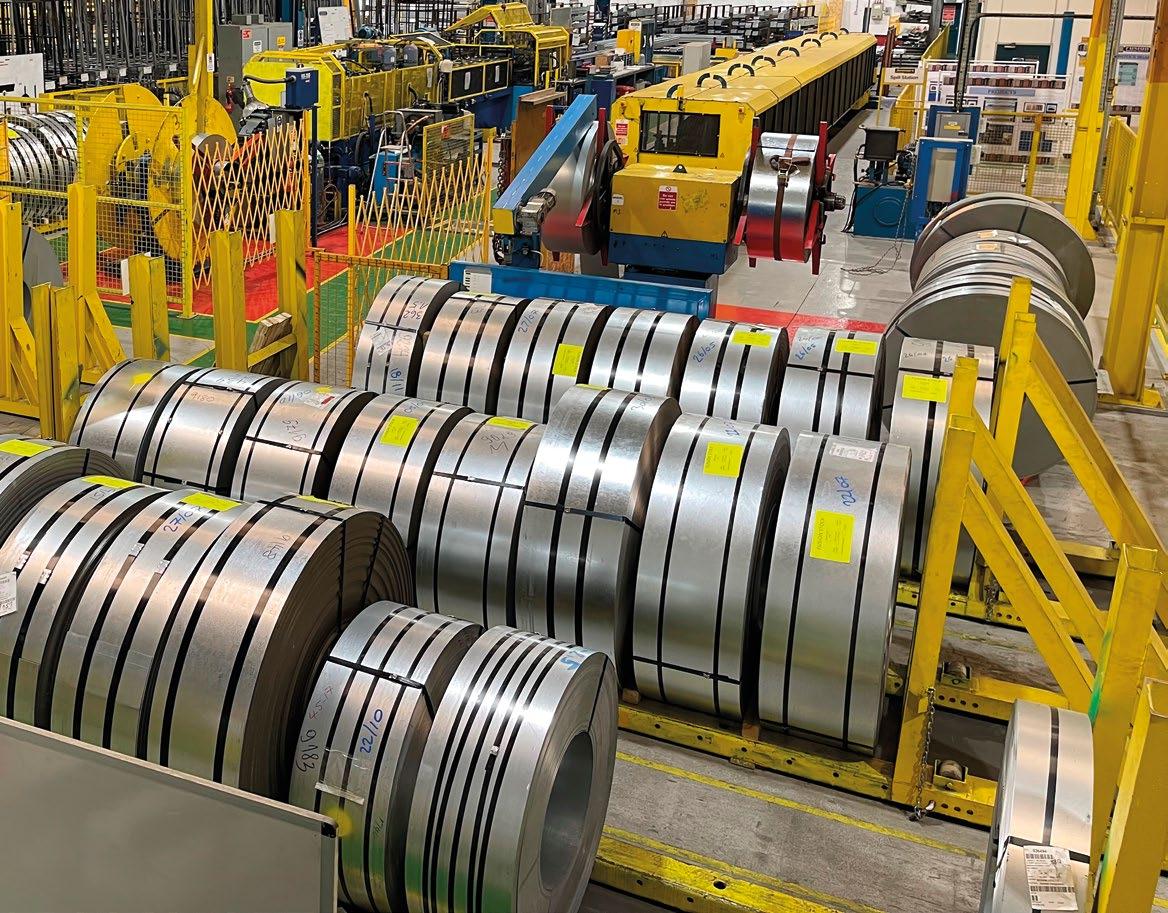
of our digital transformation strategy we are committed to the implementation of integrated design, procurement and production, with the application of a golden thread and through compliance with the Building Safety Act and Building Information Modelling (BIM) systems.
We are also committed to deploying varying forms of MMC as we progress towards the introduction of the FHS from 2025 and our voluntary net zero pathway commitments set out in our 2030 Roadmap. Given the skills shortage, and the necessity to build more quickly and innovate to meet more stringent environmental and quality standards, the sector will be transformed during this decade. Moreover, the Homes England 2021-26 Affordable Homes Programme and MMC policy brief designates a pre-manufactured value (PMV) baseline score of 55%, with additional funding achieved up to a 75% score. Such commitments drive innovation and, coupled with our growth ambitions, was a major factor in our strategic acquisition of Fusion Steel Framing (Fusion) during the summer of 2022. The investment gives Hill and its partners a competitive advantage in harnessing light steel framing innovation, optimising cost control, and ensuring supply and quality of finished product to mitigate the industry’s skills shortage.
Fusion complements the purchase of VML in 2021 and increases our capability to provide structural kits for volumetric modules, bathroom/shower pods and prefabricated utility cupboards (PUCs), offering the opportunity for fully integrated structures. Using the governments MMC Definition Framework Guide, we have or are, undertaking categories two to seven across at least 25% of our projects and completed units.
In autumn 2022, in response to the shifting demands of the UK housing market, VML unveiled an expanded range of modular accommodation technology, including the DuoHaus for two people and the FamilyHaus for four to complement the SoloHaus. Pleasingly, VML won the Product Innovation Award at the Offsite Awards for the DuoHaus modular home.
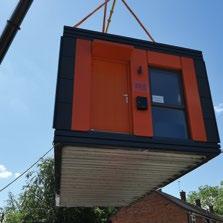
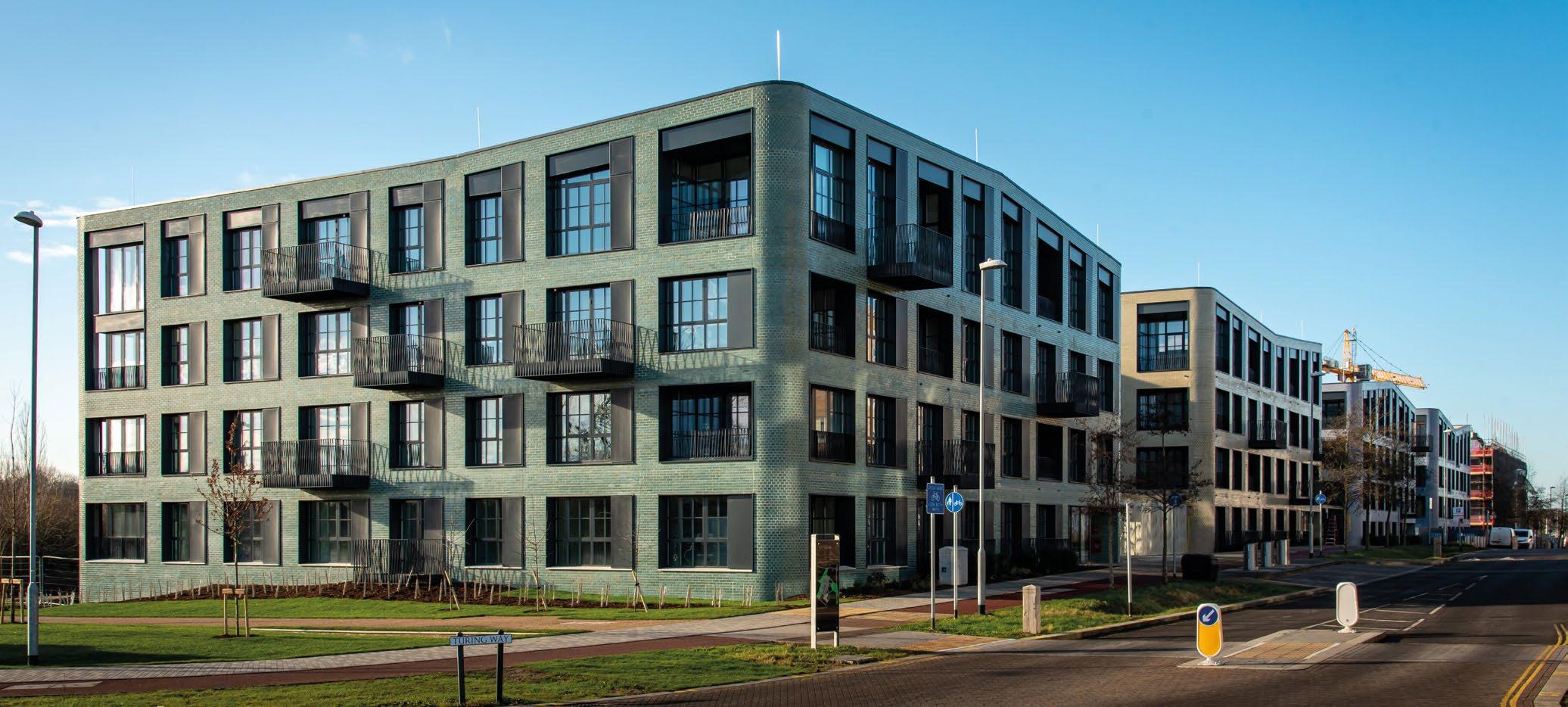
Historically the NextGeneration Sustainability Benchmark (NextGen) selects the largest 25-housebuilders in the UK, based on their housing turnover and annual completions, for benchmarking. Additionally, the benchmark sets out good practice and is driving positive change in the industry. In 2022, the membership extended to the benchmarking of 28 housebuilders. Its engagement is based on:
• Phase 1: Homebuilders are assessed on their publicly available sustainability information, against the 60+ public criteria of the benchmark covering the ESG spectrum.
• Phase 2: NextGen members provide internal sustainability information to be benchmarked.
We believe being a NextGen member benefits us in three ways: by helping us to comply with ESG-related statutory obligations; by supporting our license to operate; and by helping us to add value to our business plan and prepare us for our net zero pathway ambitions.
We were pleased to improve our ranking to fifth, the highest-placed private developer, compared with sixth in 2021 and ninth in 2020, and to receive a bronze award. During 2023, we aim to improve our score by at least 2.5%, and to continue to collaborate with the FHH and NextGen for its criterion to be incorporated into the FHS. It is important to achieve continuous improvements.
Since we secured the first major Sustainability-linked loan (SLL) in the housebuilder sector in 2021 a number of peers have secured similar loan facilities, although their criteria have varied greatly and continue to diversify. We are, therefore, supportive of the FHH work in this area to set out an Industry framework and to consolidate practices based on the relevant NextGen criterion.
With access to a syndicated facility of £220m that is provided by Lloyds, NatWest, HSBC UK, and Santander UK, and we expect to crystallise the facility during the business plan period to 2025. In the meantime, we aim to annually progress and move towards achieving the following four targets that underpin our commitment:
• Biodiversity Gain (BG): We achieved a 34.14% (25%:2021) improvement, which is well above our stated 20%:2022 target, and looking ahead we aim to meet 30%:2025 objective. We are well positioned to achieve the national target of 10% that comes into force from November 2023.
• Reducing operational carbon in the homes we produce: We achieved an SAP rating of 85 (85.45:2021) compared to a target of 87, with the national average 84. Without securing new revised planning consents and or regulatory approvals, this innovation lag could lead to performance below the targeted 1-point annual incremental improvements. Positively, we are preparing in readiness for the FHS.
• Reducing scope 1 and 2 carbon emissions in our business operations: We are currently meeting the 10% reduction criterion compared to a 2020 baseline and during 2022 we achieved a 40.4% reduction.
• The company’s overall sustainability rating as measured by the NextGeneration sustainability benchmarking of the UK’s top housebuilders: During 2022, the secretariat undertook a three-year review of the benchmark, resulting in a significant set of criterion changes. Consequently, nearly all participant scores were reduced compared to 2021 and we did not accomplish our 2.5% improvement objective. However, our overall ranking improved from sixth to fifth place.
In accordance with our 2030 Roadmap, we have developed a wider suite of KPIs. We have RAG rated our 2022 performance and aligned each KPI to the relevant UN SDGs. In summary, we are making good progress in achieving or partially achieving the goals we set ourselves. Given the challenging nature of the SLL trajectories, we have room for improvement during 2023-25.
We believe it is important to gain independent assurance of our work. Compared with 2021, we have increased the scope of this report and its assurance in accordance with the NextGen criterion, to include our Social Value pillar and, explicitly, Foundation 200. Furthermore, publication of our first TCFD statement is a crucial step in publicly disclosing our climate change risk management and corporate commitments. As an output of the double materiality review, we will appraise how we can provide project data to clients and partners when they are reporting against the Sustainability Reporting Standard for Social Housing.
Primarily, we believe our ESG strategy must coalesce around the FHS and ensure compliance with the requirements of Companies House. However, we will always be cognizant of the changes being applied to listed public companies to manage risk and added value. Also, we will be mindful of the UK-Green Building Council and its partners’ innovation workstreams, and the work of the UN SDGs for improved disclosure purposes.
During 2023 we will voluntarily undertake an SBTi review and further develop our inaugural approach to a Just Transition statement. During 2023 - 2024, we will evaluate the need to compare our ESG strategy and disclosure with indices such as:
• CDP (Carbon Disclosure Project).
• The combined CSRD / GRI (Corporate Sustainability Reporting Directive / Global Reporting Initiative) indices.
• SASB (Sustainability Accounting Standards Board).
• The Sustainability Reporting Standard for Social Housing.
These standards do not constitute an exhaustive list of reporting frameworks. For example, the outputs of COP27 and the Taskforce on Nature-related Financial Disclosures (TNFD), COP15 and the EU and UK Taxonomies will become standard practices in the medium term, if not sooner.
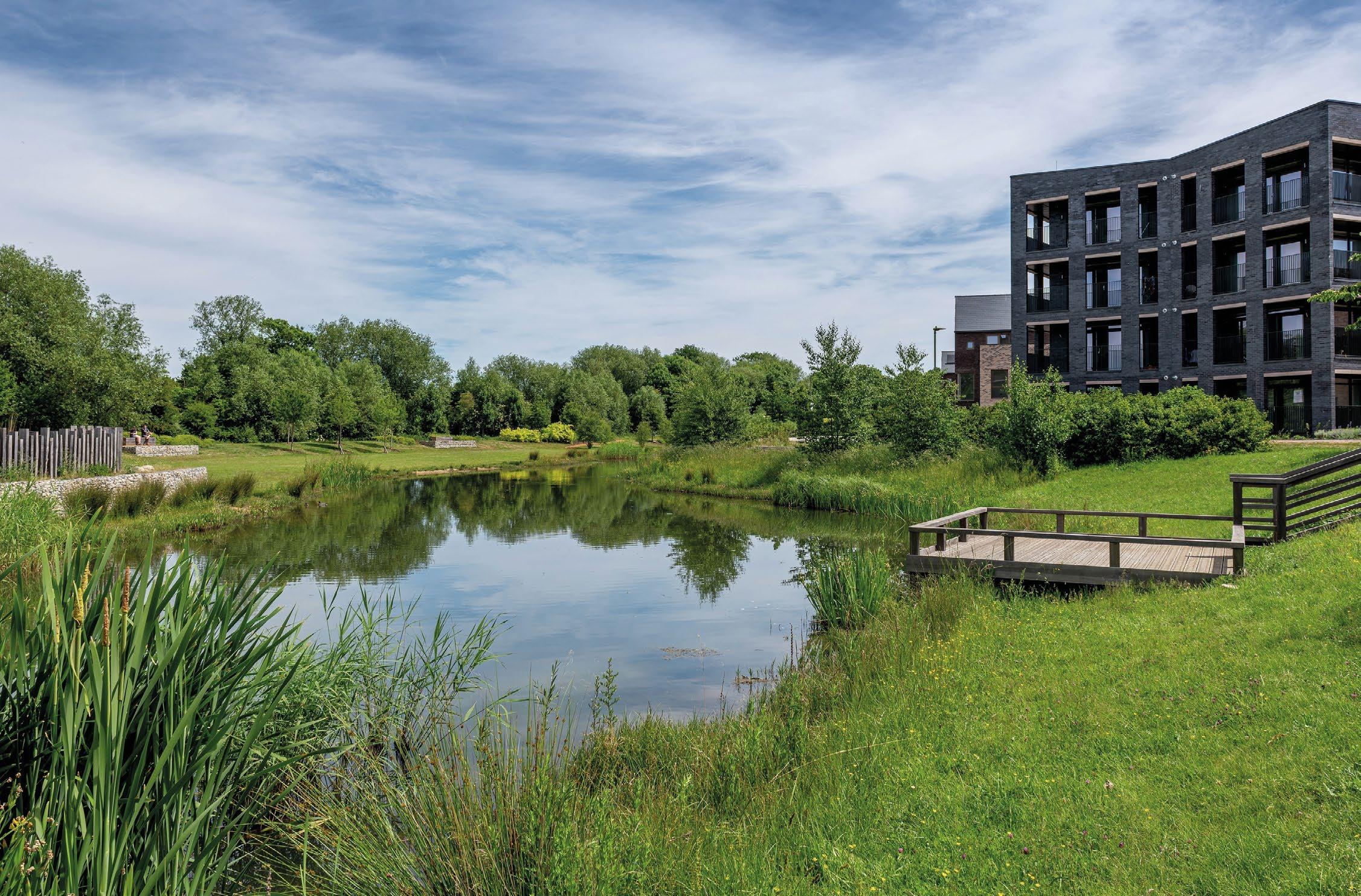
1. Introduction and objectives of work
Bureau Veritas UK Ltd (‘Bureau Veritas’) has been engaged by The Hill Group (‘Hill’) to provide limited assurance of its GHG emissions (Scope 1, Scope 2 and partial Scope 3) and other selected ESG KPIs (the ’Report’). The objective is to provide assurance to Hill and its stakeholders over the accuracy and reliability of the reported information and data.
2. Scope of work
The scope of our work was limited to assurance over the following information included within the report for the period January 1st 2022, to December 31st 2022 (‘the Selected Information’):
• Scope 1 emissions, Scope 2 emissions (market & location based) Selected Scope 3 emissions (Waste generate, Water consumption, Business travel, Use of products sold (Regulated CO2 emissions of the homes completed by Hill Group in 2022 calendar year)
• Selected ESG KPIs (Scope 1 & 2 performance compared from 2021 and 2022, Biodiversity Gain (BG) on pre-Planning projects 2022., Average SAP score Use of products sold (Regulated CO2 emissions of the homes completed by Hill Group in 2022 calendar year)., Verification of Social Return On Investment evaluation of Foundation 200 (F200 SROI evaluation) for Hill Group performed by external third party (measured as value per amount invested)
Our assurance does not extend to any other information included in Hill’s ESG report.
3. Reporting criteria
The Selected Information needs to be read and understood together with the methodology set out in Hill’s ESG report for each category of GHG emissions and selected ESG KPIs
Verified GHG Emissions
Scope 1 emissions (t CO2 e)
Total: 3,020
Natural Gas: 51
Heating Oil: 0
Red Diesel: 1,178
LPG: 18
White Diesel: 1,068
Biodiesel: 26
Company Cars: 680
4. Limitations and Exclusions
Limitations and exclusions apply – please refer to full statement which can be accessed online via esg.hill.co.uk
5. Responsibilities
This preparation and presentation of the Selected Information in the Report are the sole responsibility of the management of Hill.
Bureau Veritas was not involved in the drafting of the Report or of the Reporting Criteria. Our responsibilities were to:
• Obtain limited assurance about whether the Selected Information has been prepared in accordance with the Reporting Criteria;
• Form an independent conclusion based on the assurance procedures performed and evidence obtained; and
• Report our conclusions to the management of Hill.
6. Assessment Standard
We performed our work to a limited level of assurance in accordance with International Standard on Assurance Engagements (ISAE) 3000 Revised, Assurance Engagements
Other than Audits or Reviews of Historical Financial Information (effective for assurance reports dated on or after December 15, 2015), issued by the International Auditing and Assurance Standards Board.
7. Conclusion
On the basis of our methodology and the activities described above nothing has come to our attention to indicate that the Selected Information in the table below is not fairly stated in all material respects.
Scope 2 emissions (t CO2 e)
Total: 812
Market-based: 0
Location-based: 812
Average Biodiversity Gain (BG) on pre-Planning projects 2022
Scope 1 & 2 decrease from 2021 to 2022
Scope 3 emissions (t CO2 e)
123,471 Waste generated: 787
Water Consumption: 60
Business travel: 1,184
Use of products sold: 121,440
Average SAP score Use of products sold (Regulated CO2 emissions of the homes completed by Hill Group in 2022 calendar year) 85
Verification of Social Return On Investment evaluation of Foundation 200 (F200 SROI evaluation) for The Hill Group performed by external third party (measured as value per amount invested)
Bureau Veritas is an independent professional services company that specialises in quality, environmental, health, safety and social accountability with over 190 years history. Its assurance team has extensive experience in conducting verification over environmental, social, ethical and health and safety information, systems and processes.
Bureau Veritas operates a certified1 Quality Management System which complies with the requirements of ISO 9001:2015, and accordingly maintains a comprehensive system of quality control including documented policies and procedures regarding compliance with ethical requirements, professional standards, quality reviews and applicable legal and regulatory requirements which we consider to be equivalent to ISQM 1 & 22
Bureau Veritas UK Ltd
Registered in England & Wales, Company Number: 1758622
Registered Office: Suite 206 Fort Dunlop, Fort Parkway, Birmingham, B24 9FD London, 30th March 2023
CONTACT
Head Office
The Power House
Gunpowder Mill
Powdermill Lane
Waltham Abbey
Essex EN9 1BN 020 8527 1400
Cambridge Office
The Courtyard
Abbey Barns
Duxford Road
Ickleton Cambridgeshire CB10 1SX 01223 792700
Oxford Office
Suite A
Windrush Court
Abingdon Business Park
Abingdon Oxfordshire OX14 1SY
Email recruitment@hill.co.uk land@hill.co.uk sales@hill.co.uk info@hill.co.uk
Crawley Office
Westfield House
Bonnetts Lane Crawley
West Sussex RH11 0NY 01293 572260
Norfolk Office
Suite 45 37 St Andrews Street
Norwich Norfolk NR2 4TP